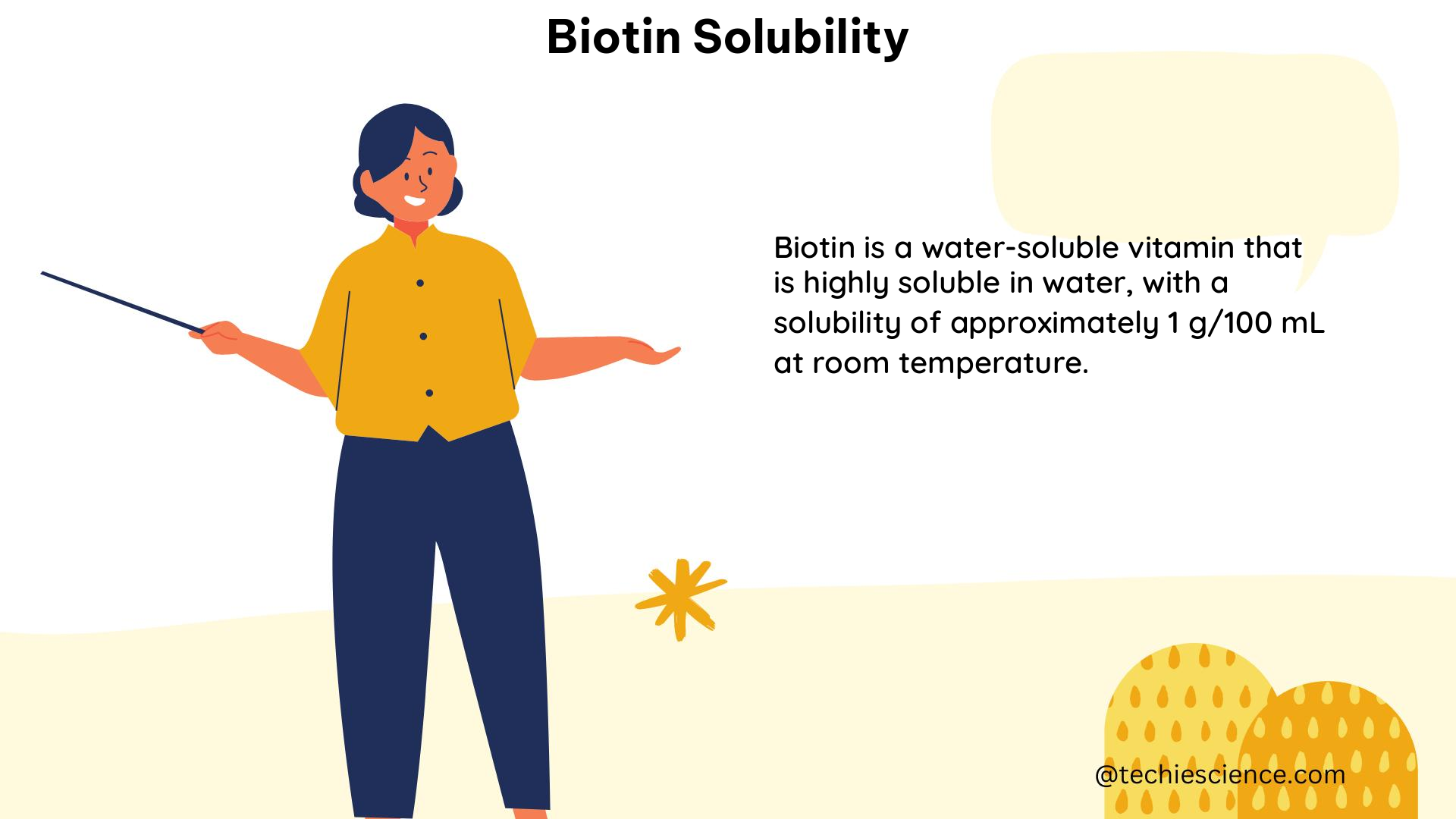Biotin, also known as vitamin B7 or vitamin H, is a water-soluble vitamin that exhibits unique solubility characteristics. This comprehensive guide delves into the intricate details of biotin’s solubility, providing a wealth of technical information for science students and enthusiasts.
Understanding Biotin’s Solubility Properties
Biotin is a slightly soluble compound in water and alcohol, with its salts being quite soluble. However, the compound is considered poorly soluble in water, requiring 4-5 hours to fully dissolve when prepared according to the CEN (European Committee for Standardization) procedure.
Solubility in Aqueous and Organic Solvents
- Biotin is sparingly soluble in water and alcohol, with a solubility of approximately 20 mg/L in water at 25°C.
- The compound is soluble in dilute alkali solutions, with increased solubility in the presence of hydroxide ions.
- Biotin is insoluble in most organic solvents, including ether, chloroform, and benzene.
Stability and Degradation
- Biotin in solution is quite stable within the pH range of 4 to 9, but it can be degraded by exposure to ultraviolet (UV) light.
- The vitamin is relatively stable when heated in food products, and it is not easily destroyed during the ordinary cooking processes. However, it can leach into the cooking water.
- Processing of food, such as canning, can cause some losses in biotin content.
Biotin Metabolism and Excretion

Studies on the metabolism of biotin in rats have provided valuable insights into its solubility and distribution within the body.
Urinary and Fecal Excretion
- Approximately 85% of the radioactivity from administered biotin was excreted in the urine within 24 hours, and 87% was excreted over 3 days.
- Approximately 7% of the radioactivity was recovered in the feces over the 3-day period.
Tissue Distribution
- Approximately 5% to 8% of the radioactivity remained in the liver after 3 to 6 days.
- Considerably less radioactivity was found in the kidneys and spleen.
- No detectable radioactivity was observed in the adrenal glands, mesentery, lungs, blood, thyroid gland, or skeletal muscle.
These findings suggest that biotin is efficiently absorbed and rapidly excreted, with a significant portion being retained in the liver.
Practical Considerations for Biotin Solubility
For DIY applications or experimental purposes, it is possible to prepare biotin solutions by dissolving the biotin powder in water or alcohol. However, due to its poor solubility in water, the dissolution process may take some time.
Dissolving Biotin in Water
- To prepare a biotin solution in water, it is recommended to use a small amount of heat to aid the dissolution process.
- Caution should be exercised to avoid overheating the solution, as biotin can be degraded by exposure to high temperatures.
Utilizing Dilute Alkali Solutions
- Biotin is more soluble in dilute alkali solutions, such as those containing hydroxide ions.
- Considering this, you can explore the use of dilute alkali solutions to make biotin solutions more readily.
Biotin Salt Solubility
- The salts of biotin, such as sodium or potassium biotin, are quite soluble and can be used as an alternative to the pure biotin compound.
- Dissolving biotin salts in water or other suitable solvents can provide a more readily available biotin solution.
By understanding the nuances of biotin’s solubility, researchers, scientists, and enthusiasts can effectively work with this essential vitamin and explore its various applications.
References:

The lambdageeks.com Core SME Team is a group of experienced subject matter experts from diverse scientific and technical fields including Physics, Chemistry, Technology,Electronics & Electrical Engineering, Automotive, Mechanical Engineering. Our team collaborates to create high-quality, well-researched articles on a wide range of science and technology topics for the lambdageeks.com website.
All Our Senior SME are having more than 7 Years of experience in the respective fields . They are either Working Industry Professionals or assocaited With different Universities. Refer Our Authors Page to get to know About our Core SMEs.